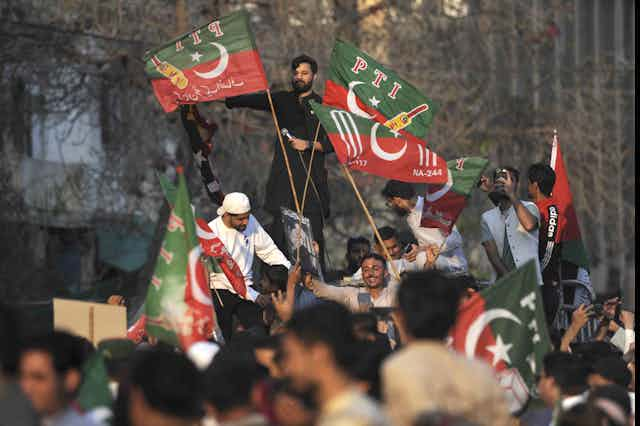Shock results in Pakistan’s national election threaten to see the country free-fall into political crisis. Days after the election, it remains unclear which party (or parties) will form a government and who the next prime minister will be.
Independent candidates affiliated to Pakistan Tehreek-e-Insaf (Pakistan Movement for Justice/PTI), the party of former prime minister, Imran Khan, won 95 of 264 seats. This puts it in the lead, ahead of Nawaz Sharif’s Pakistan Muslim League (PML-N) in second place. However, with 75 seats, PML-N is the largest single party in the national assembly.
It’s fair to say Pakistan doesn’t have a brilliant track record when it comes to putting democracy into action. No elected prime minister has completed a full term in office. The country has been under military rule for nearly as much time as it has been under a civilian government. And the military has long directed the country’s politics from behind the scenes.
Allegations that the election was likely to be rigged were rife months before voters headed to the polls on February 8. Khan, who remains widely popular, was barred from running in the election and is currently in prison having been sentenced on three separate occasions in recent weeks. Many candidates for his party were imprisoned or otherwise harassed and hounded out of politics.
The Election Commission of Pakistan also banned PTI candidates from using the electoral symbol of a cricket bat. They had to stand as independents with individual symbols, a sure impediment in a country of large rural constituencies where high numbers of voters cannot read.
As voting got underway, the interior ministry suspended mobile calls and data services – a move it said was essential to “maintain law and order” after a string of terrorist attacks in the days leading up to the election. The internet blackout meant it was not possible for many urban voters to book taxis to go and cast their vote or coordinate plans with other family members. Violence on election day itself left 28 people dead.

Close contest
Once the results started trickling in, independent candidates aligned to PTI were out ahead. There were then significant delays in the processing and announcing of further results, leading to fears that the outcome would be manipulated by the military who PTI supporters feared were intent on suppressing Khan’s party.
Despite the military’s interference, the elections have resulted in political uncertainty. Behind the scenes, Sharif and his PML-N is negotiating power-sharing with Bilawal Bhutto Zardari’s Pakistan People Party (PPP). He is also hoping to co-opt some of Khan’s PTI-backed candidates, and is showing some success.
If he manages to put together a coalition, Sharif will come to power with much baggage. He was dismissed as prime minister in 2017 over corruption allegations – and accusations of nepotism have, in the past, landed both he and his daughter Maryam in prison.
The army, who many believe selected Sharif as their man, seem to have weighed the baggage and decided to hedge their bet – a wager they may be coming to regret. The Pakistan military is often referred to as the army that has never won a war and never lost an election: 2024 may have disrupted that.
Stability is unlikely
Pakistan has precedence for not honouring the will of the electorate. In December 1970, at the country’s first direct national election, the Awami League won 167 out of 169 seats in East Pakistan, while The PPP won 87 out of 138 seats in West Pakistan. These results meant the Awami League had won an outright majority to govern the whole of Pakistan.
However, the national assembly was postponed, leading to protests, a civil war and eventually to a national split and the end of the bifurcated era. East Pakistan became Bangladesh and West Pakistan simply became Pakistan.
Over half a century later, it is unlikely that Khan will stay quiet if his party is denied power. He enjoys, for now, the enduring popular support of Pakistan’s 128 million voters. And Khan has managed to shift the zeitgeist, leading to the unprecedented open criticism of Pakistan’s all-powerful military.
But the country’s political uncertainty comes at a time of severe economic crisis. Strong and stable leadership is required to steer Pakistan’s struggling economy.

Pakistan’s economy is in crisis
Figures released by Pakistan’s Bureau of Statistics in January 2024 revealed that inflation was nearly 30% higher than at the same point the previous year. The cost of essentials such as wheat, sugar and vegetables are now unaffordable for many ordinary people whose wages are being stretched to breaking point.
The number of people living in poverty in Pakistan has climbed to nearly 40%. And price hikes for electricity and fuel in September 2023 led to protests, with thousands taking to the streets and burning their electricity bills.
On top of this, Pakistan will have to repay its substantial external debt – US$77.5 billion (£61.4 billion) over the next three years, with a currency that is depleted of value. In August 2023, Pakistan’s rupee fell to a record low of 299 to the dollar.
With increased economic hardship and little opportunity at home, many Pakistanis are making perilous journeys out of Pakistan. Young people especially are being driven to find a better life elsewhere, sometimes with deadly consequences. In June 2023, more than 300 Pakistani migrants died when an overcrowded fishing vessel sank off the coast of Greece.
Pakistan’s new leader will need new ideas on how to get their country out of economic trouble and improve the lives of his countrymen. Whoever it may be.

